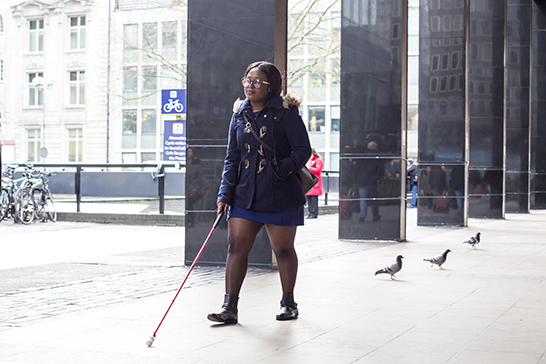Why openness is key to the Wayfindr Open Standard

This is a guest-blog written by Anthony Giannoumis. Anthony is an Assistant Professor of Universal Design at Oslo and Akershus University College of Applied Sciences, and an international research fellow at the Burton Blatt Institute at Syracuse University. Anthony’s research focuses on technology law and policy. He is currently researching the design and implementation of policies aimed at ensuring equal access to technology. Anthony is collaborating with Wayfindr to help promote the use of the Wayfindr standard in practice.
An open standard provides startups, and social enterprises, with an opportunity to empower communities from around the world – by giving them access to information for free. In Wayfindr’s case, it allows them to promote access to society for people with a vision impairment. Wayfindr’s Open Standard is based on three principles, collaboration, quality, and availability.
Collaboration
When Wayfindr creates their open standard, they use a collaborative process. In other words, businesses, government agencies and public sector organisations have the opportunity to contribute to and initiate standardisation, from the bottom-up.
This means that standardisation activities are voluntary, that they are community driven and that they require buy-in and consensus from all relevant parties. These collaborative practices enable Wayfindr to respond to a variety of perspectives and to ensure a fair, reasonably balanced process.
This results in a standard that represents a variety of interests – rather than a standard that is dominated by one group.
Quality
By using a collaborative – user centred – process, Wayfindr is also able to create a higher quality standard. The quality of a standard relates to whether – and how – it promotes the interoperability of technology.
In other words, if a standard is high-quality businesses can use it to create new technologies that can communicate, or fit, with existing products and services.
By using an open process that focuses on the quality of the standard, Wayfindr is able to help foster an industry – and reward early adopters by creating a network of compatible technologies.
In addition, Wayfindr can use their open standardisation processes to provide on-going support and maintenance of the standard, feeding advice and consultations from their partners worldwide into future versions of the standard.
This enables Wayfindr to contribute to the long-term strategic development of audio-based navigation technologies – and to the sustainability of the industry.
Availability
Wayfindr’s open process provides a unique opportunity to make their standards publicly available. By making the standard available to everyone – free-of-charge – Wayfindr empowers the community to adopt and disseminate the standard around the world.
By using an open process, Wayfindr maintains the right to publish and reproduce and to give that same right to others that want to use the standard to promote access to society for persons with disabilities.
These three principles, collaboration, quality and availability, mean that when Anne, who recently got a job at a startup, wants to make sure that her company complies with disability anti-discrimination laws, she’ll be able to use Wayfindr’s standard to ensure that their new product or service is accessible for persons with disabilities.
It means that when John, who is finishing his engineering degree, decides he wants to create a new product to enable the blind and partially sighted to navigate indoors, he’ll know that his invention will work effectively for persons with disabilities.
It also means that when Sandra, an industry veteran, wants to pitch a new product line to her supervisor, she’ll be able to assure them that it is compatible with solutions that already exist on the market.
You can explore the Wayfindr Open Standard here.
Our team combines the digital product and user centred design expertise of ustwo, with the Royal London Society for Blind People’s 175 years of experience working with blind people.